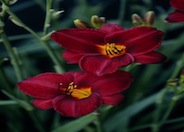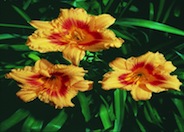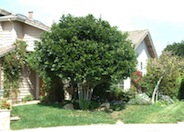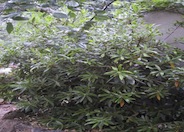
Common name:Frankly Scarlet Hybrid Daylily
Botanical name:Hemerocallis 'Frankly Scarlet'
These summer-blooming perennials form clumps with large, grass-like leaves. Its showy red flowers, resembling lilies, are borne in clusters on stems held well above the foliage. 4" blooms build color intensity throughout the day. Blue green, dense, 24" tall foliage makes an excellent landscape statement. Scarlet blooms shine in the heat. Daylilies prefer full sun and regular watering. Provide well draining, rich soil. Cut spent flowers to encourage reblooming.

Common name:Black-Eyed Stella Hybrid Daylily
Botanical name:Hemerocallis 'Black-Eyed Stella'
This beautiful Daylily is stunning with a bright, yellow gold flower with a dark orange eyezone and dark green, grass-like foliage. This Daylily looks better in mass plantings. It reaches 2' tall and blooms in spring and sometimes summer. It prefers full sun and regular watering, with lots of compost and mulch.

Common name:Carrotwood, Cupania
Botanical name:Cupaniopsis anacardioides
This evergreen tree will grow up to 40' high and has leathery, dark green leaves. When the trees approach maturity, yellow to orange fruit may be produced; it does well in wet soil.

Common name:Kanooka Box, Water Gum
Botanical name:Tristaniopsis laurina
This slow growing, evergreen, multi-trunked tree is 20' tall and 10' wide. It has a dense, rounded crown with yellow flowers that bloom in late spring, and attractive leaves and bark. It requires regular watering.
Photographer: GardenSoft
Incorporate compost 6" into your soil to retain water, reduce compaction, feed earthworms, and provide valuable nutrients to your plants.
Group plants in your garden according to their water needs (hydrozone).
Attract, or buy beneficial insects such as ladybugs and lacewings to control pest outbreaks in your garden.